Are you looking for online courses related to the R programming language and technology? If so, look no further – this DataCamp review is for you.
We’ll begin by talking about DataCamp itself – what it is, what it does, how it came to be and so on.
After that, we’ll jump straight into the actual DataCamp review – I’ll tell you about the features, price learning experience, and everything else needed for you to develop an idea of whether or not you would like to use the services of this platform.
Let’s go.
Table of Contents
DataCamp Review: Introduction
DataCamp is a MOOC-providing platform established in 2014. In this context, MOOC stands for Massive Open Online Courses – this means that the company specializes in providing online courses to students all over the world. Now, how is DataCamp different from any other MOOC-based platform?
The site specializes almost solemnly in courses that revolve around the topics of data science and R programming. As they themselves state, more than 90% of the world’s data has been created in the past two years – this means that there’s a need for data-savvy specialists now more than ever before.
The platform aims to teach people the essential skills needed to work with data – all in the comfort of their own home (or wherever else they might be; the courses are taught and transmitted through an internet browser, meaning that you can learn them practically anywhere where there’s an internet connection).
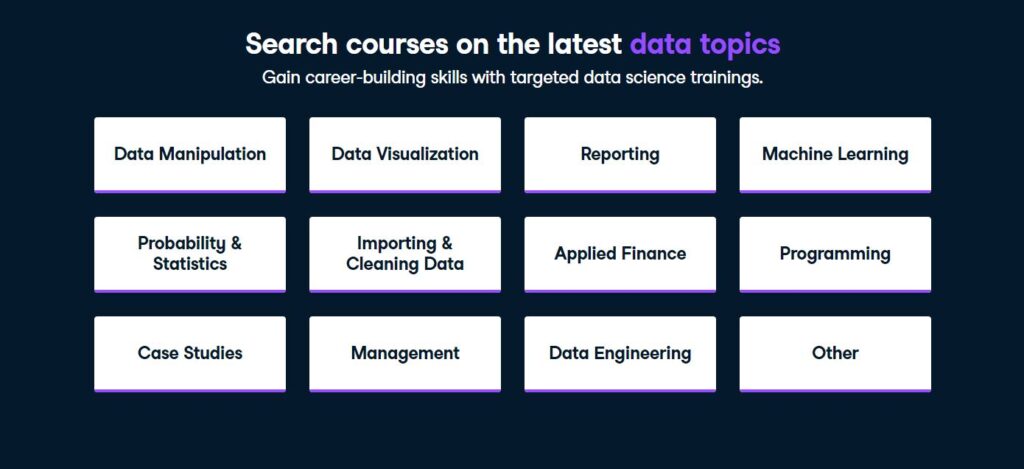
Now that you’re a bit more familiar with the site, let’s go straight to the actual Data Camp review.
Who Is Datacamp For?
You may be a little unsure if Datacamp is the right platform for you?
Well, let me explain exactly what learning programs Datacamp offers. It has close to 350 courses focusing on a variety of data science technologies from R language, Python to Spreadsheets and Excel (see image below). Its courses are designed to be bite-sized and digestible for learners combining short expert videos with immediate interactive exercises to complete.
If you are a complete beginner or have a good level of knowledge on subjects related to data science then this platform will have something for you.
Ease of Use
Many e-learning platforms these days try to pack as much stuff as possible within them. Since the market is becoming more and more competitive, some companies are trying to lure in potential new students by offering a huge quantity of various content.
Oftentimes, however, this results in the platform becoming over-encumbered and really frustrating to navigate through.
The very first thing that you’ll see once you enter DataCamp’s main page is a banner with a registration form and a short, simple one-liner – “Learn data science online”.
I have to admit, I was actually pleasantly surprised – the whole page is very simplistic, has a contrasting color palette (it doesn’t bother your eyes), portrays the main information and some “call to action” type of stuff, and that’s basically it! It’s simple, yet effective – the website immediately caught my interest.
You can access the courses by either entering a keyword into the search bar or picking one from the drop-down menu on the top of the page. Once you go to the “All Courses” page, you’ll be able to see the recommended courses, ones sorted by topic or technology, upcoming additions or even browse the library.
When you pick a course and enter its designated page, you’ll probably immediately notice one thing – it’s as simple and basic as they come.
I mean, honestly – I have not seen a more basic course landing page in my life. I was a bit confused at first, thinking that I’m probably missing something, but nope – that’s all you get! Some general info about the course, a description, instructor info and a lesson list. That’s literally it! I haven’t even seen many of the DataCamp reviews mention this – it’s a big deal!
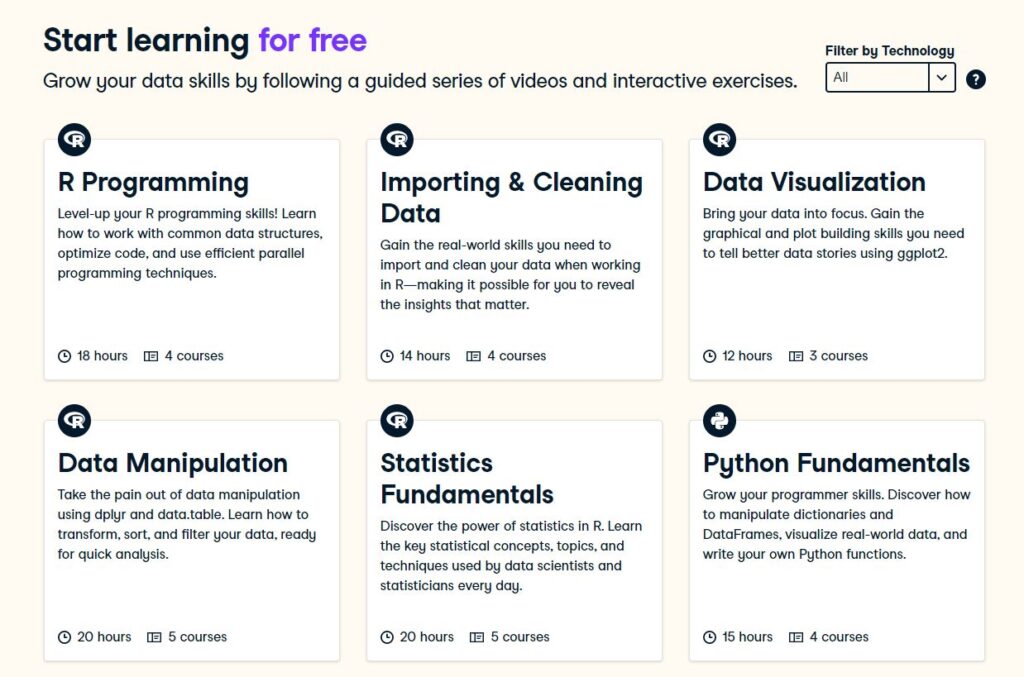
I have to commend DataCamp – I really don’t know if this is a smart move marketing-vise, but for the students, the page is awesome – no annoying pop-ups, no ads, no “recommended courses” or “you might also like…” or anything like that. Once you come to a specific course page, all of your attention can be directed at that single course.
Overall, I have to say – I’m surprised by the direction that the company took when it comes to the page layout design. And why am I telling you all of these things in the first place? Isn’t this supposed to be a “site’s usage” part of the DataCamp review? Well, it is!
All of the above-mentioned information comes into play when deciding whether the site is easy to use or not. And when it comes to this DataCamp review, I have to say – the platform really is easy and fun to both navigate and use in general!
I had no trouble finding the things that I was looking for (“about” section, course list, partners, pricing), the whole user interface felt intuitive and easy to use and, in general, my experience was quite pleasant. I’ve noticed that many other Data Camp reviews also don’t seem to have any notable issues when it comes to how easy it is to navigate and find things on the site. So, so far – so good!
Content Quality
A lot of people wonder “is DataCamp worth it?”. Content quality plays a big role in answering this question. This is probably a no-brainer, but if an online education-based company wants to survive and build a reputation for itself, the quality of the content that it provides should be on the top of the priority list. Because this is such an important aspect, let’s analyze the quality of the content that DataCamp provides as the next step in this DataCamp review.
If you try to look for Data Camp reviews that would reflect the quality of the site’s courses, you’ll probably notice a common trend. It can probably be summed up with the following statement:
“DataCamp is great, but…”
Most of the DataCamp reviews that are talking about the courses on the site that I’ve come across were very two-sided. Students seem to really genuinely enjoy the site, yet there’s always something that they didn’t particularly like.
Some of the most common complaints when it comes to the content on DataCamp is that it’s a) not very practical, and b) is way too text-based. Students claim that, while there are usually great examples given, the instructors tend to get somewhat hand-holdy and “do the work for you”. This way, you lose the opportunity to study, learn and solve the given problem yourself.
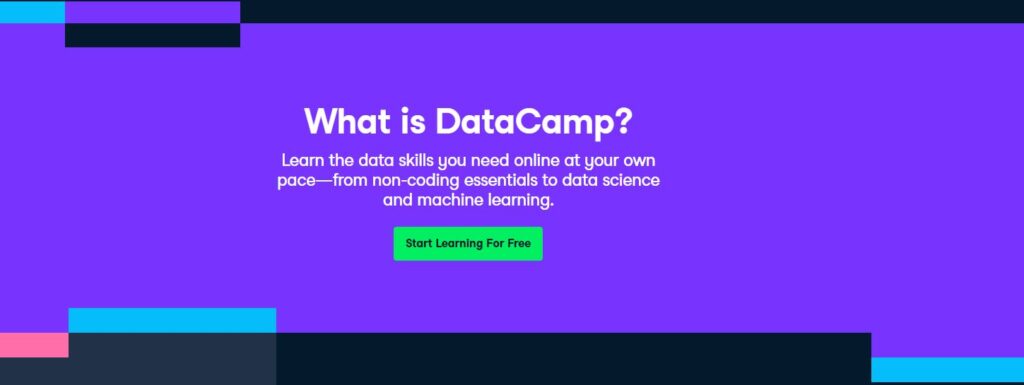
Also, while most courses do have short videos, a lot of the assignments are very text-reliant – this results in huge walls of text, which can make you very discouraged (especially if you’re a beginner).
With that said, it is worth emphasizing that these aren’t really ground-breaking problems – these Data Camp reviews admit that the content is great, but there’s still room for improvement. The vast majority of students seem to enjoy and appreciate the content itself – the problems listed above are probably more related to the “quality-of-life”, rather than anything else.
All in all, it seems that DataCamp does offer quality content – there are simply a few aspects that are worth working on. With time, it is more than likely that the company will hear the student feedback, and solve these issues effectively.
Features
In order for a company to stand out of its competition, it needs to have something that would be both unique and memorable to the user. This could be a competition, an affiliate program, special offers on courses, etc. If you know a thing or two about online learning platforms, you’ll notice that these things aren’t all that unique in of themselves. However, if given some sort of a twist, they can become a staple for the platform’s success.
DataCamp does offer an interesting, albeit not that practically useful feature for its students. This feature is called “XP” or, in other words, “experience points”. Each user can earn XP by completing courses, performing certain tasks, and other actions on the site. If the student wants to reveal some sort of a hint or a method of solving a problem within a course, a certain amount of XP is used. The user’s experience is shown at the top of the profile page.
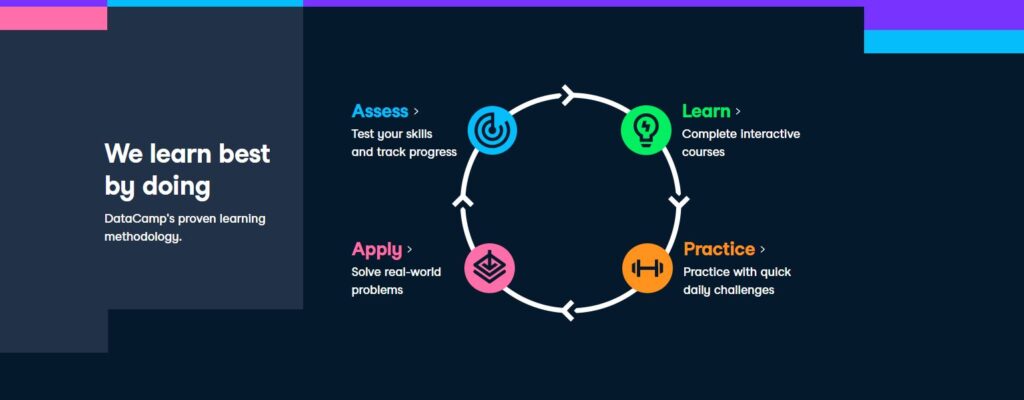
It should be said that XP doesn’t really serve a specific purpose. It’s not used in any specific way – these experience points are basically there to help you – the student – stay motivated to keep on learning.
It truly is an interesting concept. Not a lot of online learning platforms use something similar. However, even though XP doesn’t really serve a practical usage, it’s still a nice method of encouraging students to learn and finish courses. If you like this type of interactiveness, then maybe you should consider the answers to the question “is DataCamp worth it?” to be a positive one, after all.
Price
Now, this is a topic that made me really happy when it comes to this DataCamp review. No, it’s not because the prices of DataCamp’s courses are amazing (although they might be). The reason is actually much more simple than that.
As of late, I’ve been doing a lot of research on online learning platforms. Even though pricing seems to be a bit of a touchy subject, you would think that it’s important enough to be portrayed clearly on the site, right? Well, NOT BY A LONG SHOT.
I can’t stress this enough – there are sites that seemingly do everything in their power to hide the prices of their courses until you become a registered user and give them your email. That’s absolutely insane!
That said, DataCamp stands out of the crowd. It has a very clearly placed “Pricing” button on the top of the main page, which leads you to a super-clear and simple pricing plan page. It was extremely refreshing to see – again, not a lot of DataCamp reviews seem to mention this. I do, however, think that it’s somewhat of a big deal – it shows transparency and eliminates any and all suspicions of ill intent. So, let’s take a look at the prices.
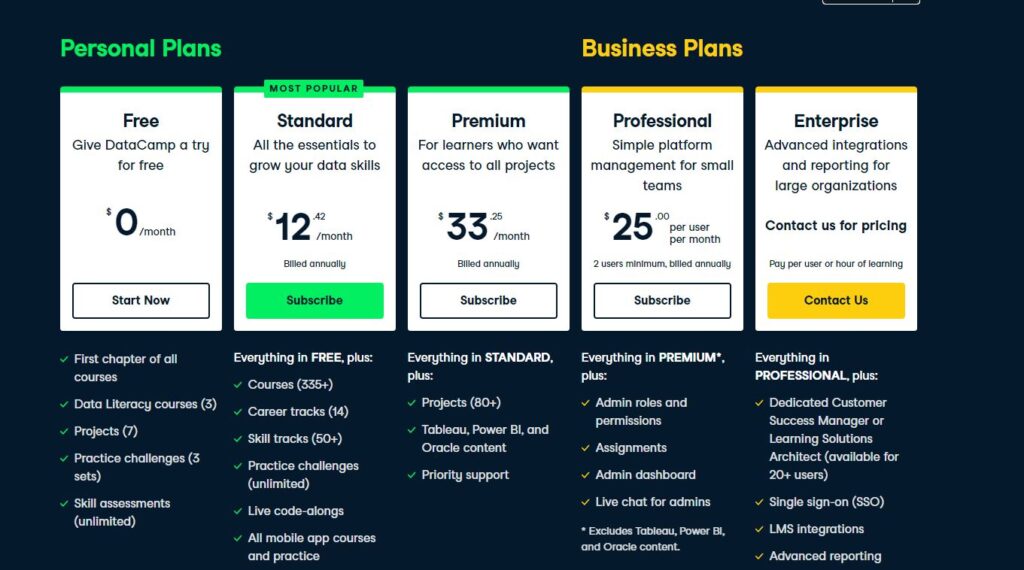
DataCamp offers two options of plans that you can pick from – courses and programs for individuals and for businesses. Individuals have three choices – pay $29 USD monthly ($348 USD for a year), pay $25 USD yearly ($300 USD per year – you’d save $48 USD), or choose to learn for free.
The “free plan” only has 7 projects available and possesses a very limited amount of practice challenges and real-world projects. However, if you choose a paid plan, you’ll receive access to 214 courses, more than 500 practice challenges and all of the additional features that the plan provides.
Compared to some other e-learning platforms, the answer to the question “is DataCamp worth it?” does seem to be a positive one, at least when it comes to the prices.
Businesses can choose to pay either $300 USD per user per year, or $499 USD per user per year. Both plans grant full access to the full content – the pricier plan, however, also has user management options and some integrations.
You wouldn’t really find many legitimate DataCamp reviews that would complain about the price of the content on the site. This just goes to show that perhaps the platform managed to find a great “price-to-quality” ratio, or is doing something else right.
Learning Experience
As a final point, we have the learning experience. Although it is more of a subjective point to cover, it’s still really worth looking in to. That being said, I will try to keep it as short and as to-the-point as possible.
In general, people seem to be quite satisfied with DataCamp and the services that the platform provides. Many of the DataCamp reviews found online are thankful and positive towards the company – it seems that students are genuinely happy about the content and the general vibe of the website. And that’s the thing, too – I have noticed that many DataCamp reviews fail to mention this as a really positive thing.
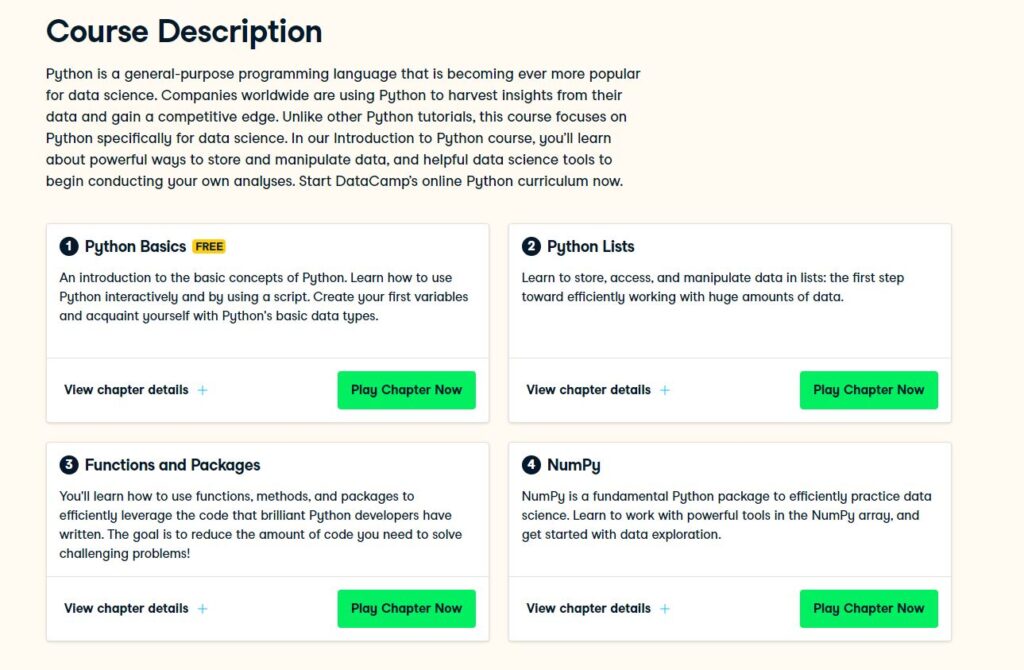
The general vibe that you get when visiting an online education-based platform is really important! This DataCamp review would have probably looked a lot more different is the site itself had left a bad taste in my mouth. However, it didn’t – I really enjoyed almost every aspect of it. Sure, there are things to adjust and perfect, but that will come with time – it’s still a comparatively new company!
Conclusions
Therefore, you should definitely give DataCamp a try if you’re interested in courses on data science.
DataCamp provides you with a flexible learning timetable, free certificates of completion, quality content, and multiple other benefits that will allow you to enjoy the courses.
